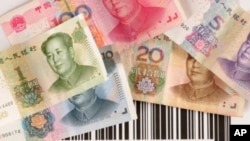Many U.S. manufacturers and members of Congress blame China for the massive U.S. trade deficit and huge losses of American manufacturing jobs. They say China unfairly manipulates the value of its currency, the yuan, to give Chinese-made products a price advantage on world markets. Beijing says the U.S. problems grow out of overspending, a lack of savings and other shortcomings. VOA explores why some analysts say this debate is missing the point.
During the past week here in Washington, officials and lawmakers have been pressing China to let the value of its currency rise.
On Monday, President Barack Obama urged his Chinese counterpart Hu Jintao to "move toward a more market-oriented exchange rate." Treasury Secretary Timothy Geithner took up the issue on Tuesday in remarks to an association of American news editors.
Geithner said he is confident that China will eventually let the value of the yuan rise and see that it is in its best interest to do so. But like President Obama, Geithner was careful to stress that it is Beijing's decision to make, not Washington's.
"China wants to be a strong independent country," said Timothy Geithner. "And as a strong, large, independent growing economy, it doesn't make sense for that country to run a monetary policy exchange rate regime that effectively lets the [U.S.] Federal Reserve [the U.S. central bank] set interest rates for their economy as a whole."
U.S. lawmakers vigorously questioned Federal Reserve Chairman Ben Bernanke this week about China's currency, with many arguing that Beijing's yuan policy is contributing to global trade imbalances and that it was one of the causes of the worldwide economic recession.
Bernanke said he generally agreed with that assessment, but he noted that a flexible exchange rate along with measures to increase domestic consumption in China would help Beijing achieve a more balanced economy.
U.S. lawmakers have threatened to pass legislation that would press the Obama administration to label China's currency as misaligned. That would allow American companies to petition for higher tariffs on Chinese imports.
But some analysts say that the focus on the yuan misses bigger reasons for the trade imbalance between the United States and China.
Derek Scissors, a research fellow at The Heritage Foundation's Asia Studies Center here in Washington says that in China, the problem is subsidized production and what the Chinese government does to support state-owned enterprises.
"It's not the exchange rate," said Derek Scissors. "It's primarily free land, costless lending and regulatory production for state companies, so that all of their costs are suppressed and the market share is guaranteed to them. Now that affects exports, but it mostly affects imports. You can't import into China the way you should be able to because state-owned enterprises are given so much assistance. The U.S. side is just a mirror of that."
According to Scissors, the problem in the United States is subsidized consumption.
"Instead of subsidizing production, we subsidize consumption," he said. "What did we do? Well first, we had very, very loose monetary policy for a long time, which led to it, but that's not the only thing. But it contributed greatly to the financial crisis and now we are subsidizing consumption by the government. The government is spending a bunch of money it doesn't have. "
Daniel Ikenson, associate director of the CATO Institute's Center for Trade Policy Studies in Washington, notes that the last time China allowed its currency to rise, between 2005 and 2008, the U.S. trade deficit with China grew - even when the value of the yuan rose by 21 percent.
"How is that possible if Americans are paying higher prices, 21 percent higher prices for Chinese products? Well, the reason is because they are not paying 21 percent higher prices because the Chinese were able to reduce their selling prices to compensate for that currency change," said Daniel Ikenson. "And I think that's what we should expect going forward."
Ikenson says that best thing would be for policy makers to realize that the U.S. and Chinese economies are complementary and that American and Chinese workers rarely are in direct competition with one another.
"The walls of the factory floor have fallen down and the factory floor now spans oceans," he said. "It spans the Pacific Ocean and it goes into China, so that high-end manufacturing in the U.S. and engineering and design is at one end of the factory floor in the United States and assemblers are at the end in China."
Ikenson argues that what is needed is for Chinese consumption to rise, not only for the sake of having balanced trade, but for balanced, global economic growth.
He says that although the world has long looked to the United States to drive consumption, many economists caution that in the wake of the global financial crisis, U.S. consumption might not be very robust in the near-term and that Beijing might find a way for its consumers to pick up the slack.




